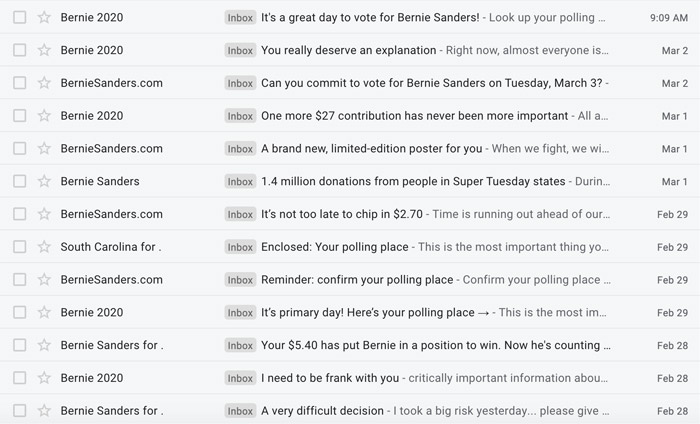A Treasure Trove of Marketing Data
One of the first things you realize about political campaigns is that they never stop. The moment after election night, campaigns immediately begin the next cycle. This includes email campaigns – LOTS of them. While many of them go unread or end up in the spam folder, underneath the mountain of emails is a treasure trove of actionable insights for email marketers.
Think About it...
Political campaigns are always testing different email formats, subject lines, and subheaders to fine tune their email marketing strategy. This process, called A/B testing, is extremely important and valuable. The only problem is that it can be difficult for small businesses to A/B test their strategy at length because of the time/cost involved. The great thing about political campaigns is that they already did much of the heavy lifting for you.

Three Lessons You Can Learn From Political Email Marketing Campaigns
We get it; filling up your email inbox with political newsletters may not be the most ideal way to deal with the stress of a cluttered inbox. That is why we compiled some quick insights to help you start fine tuning your email marketing strategy right away.
1) Landing in the Right Inbox or Gmail Tab
Let’s face it – no one really likes spam. That is why email service providers have toiled away for decades to make an email client that precisely knows what is spam and what is not. They often use complex algorithms to comb through an email, analyzing subject lines, images, and its contents to judge whether it’s worth showing you or throwing in the trash. Gmail took this a step further starting in 2013 with the introduction of email tabs, i.e. “Social” and “Promotions”. These tabs are not quite considered spam but can dramatically reduce the engagement of a campaign if you land in there.
The thing is...
These algorithms don’t always go as planned, though. Have you ever missed/lost an important email because it ended up in the spam folder? To prevent businesses from “gaming the system”, these email clients keep their spam algorithm under lock and key. This is especially true with Gmail and its tab system, but a few 2020 political campaigns have managed to perform well, especially Pete Buttigieg.
Journalists at The Markup recently conducted an internal study of all of the 2020 campaigns and determined that Buttigieg led the pack, landing in the primary tab 63% of the time, Andrew Yang 47% of the time, and Bloomberg 17% of the time. Everyone else primarily landed in “Promotions”. The study does not dig into why this is the case, but it goes to show how widely the rates can differ by sender.
2) The Curiosity Gap
OK, so you landed in the right inbox – now how do you convince someone to open the email? Enter: the almighty subject line (and often overlooked subheader). When writing these, it can be tempting to oversell the purpose of the email, but one of the most effective way to write them involves taking advantage of the curiosity gap, otherwise known as “the information gap theory of curiosity”.
First coined in 1994 by George Loewenstein, a professor at Carnegie Mellon University, the curiosity gap refers to the space between what we know and what we would like to know. By teasing the contents of your email, you can persuade users to open your emails at a higher rate. Here are a few from Bernie’s campaign…
- “You really deserve an explanation”
- “A very difficult decision”
- “I need to be frank with you”
This little trick is a powerful way to play upon human psychology, but it is important that it is done ethically and honestly.
Avoid the temptation of dishonest "clickbait"
When the curiosity gap is taken to the extreme, it can become something known as “clickbait”. This refers to the often dishonest practice of making large promises that your content could never fulfill. For example, say you own a shoe company with a newsletter subject line that reads: “You’ll never guess what we did…”, containing an announcement that you are releasing a new shoe. This could be considered clickbait because it’s actually very predictable that a shoe company would release a new shoe. After reading that subject line, users will expect that the content of the email lives up to the promise, and even though you succeeded in increasing your open rate, users will largely be disappointed. Email marketing requires that you build up trust over time with your users, and clickbait only serves to violate that trust.
3) Tailor-Made Landing Pages
Landing pages are as important for conversions as ever. When someone clicks on a link in your email, the web page that they arrive at is called a “landing page.” They offer an opportunity for marketers to customize the brand experience for various target audiences. Say, for instance, that you send a newsletter to an audience in two different states. Rather than sending both groups to the same landing page, consider tweaking the copy, imagery, and CTAs to relate to the state that someone resides in.

Anytime that you can customize the sales funnel experience is often recommended because every target market is different – motivations, dialects, urgencies, etc can vary widely.
This is where political email marketing excels. Campaigns often have mountains of data on their email lists, allowing them to segment their audiences very granularly. This approach, when done strategically, can be very successful, albeit a little time consuming. Try it for yourself!

